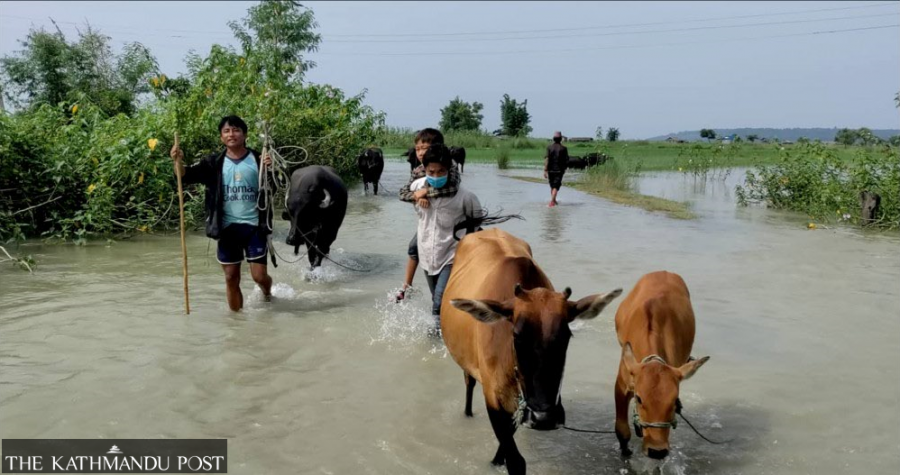Editorial
Deluge and after
The marginalised population should not be left behind while providing flood victims with relief.
Like each year, the monsoon has shown its raudra avatar yet again. As highlands across the country face gigantic landslides, lowlands continue to be submerged under water. As the Saptakoshi River eroded the western embankment, settlements in Belaka Municipality in Udayapur and Barahachhetra Municipality in Sunsari have come under the deluge, displacing over 2,500 families. Settlements in Udayapur, Saptari and Sunsari risk further inundation as the Saptakoshi has altered its course after 34 years. The three tiers of government have come together to shift the affected citizens to safer locations. Rescuing the citizens, though, is just the beginning; relief and rehabilitation efforts are going to be an uphill task.
That the authorities have started talking about building temporary shelters for the flood victims shows clearly that the rescue process itself is not up to the mark. Moreover, the aftermath of flooding also often leads to a public health crisis. So authorities must be vigilant to ensure that the citizens remain safe from infectious diseases, injuries and hypothermia, the common health hazards that follow flooding incidents. Often, financial insecurity and loss of property resulting from flooding incidents lead to mental health problems among the affected population. Not to mention the loss of access to general health care as inundation fails to leave health care facilities in affected areas.
As food production gets disrupted and food stocks remain out of bounds for the flood victims following the deluge, the authorities should come up with a formidable relief package for the flood victims. If it could not prepare well in advance to prevent the calamities, it should expedite its relief and rehabilitation process so that the citizens do not suffer. As the food supply chain gets disrupted due to inundation, the aftermath of flooding presents before the authorities a grave challenge of food security. The marginalised population is at greater risk owing to unequal distribution of relief packages even during calamities. Those at the helm should, therefore, ensure that the relief packages ensure equitable distribution of the resources.
Even as the government makes a delayed attempt to get its act together, it has asked organisations and individuals to come forward and give a helping hand by supporting its relief efforts by providing monetary and material support. Indeed, this is also the time for the entire nation to come together to help fellow citizens deal with the crisis.
The problem we face is not the deluge alone; it is the lethargy we exhibit each year after the monsoon is over that leaves us unable to deal with a similar crisis for years on end. Having little resources and alacrity to invest in advance preparation, we are often always doomed to face the severest of calamities. This time, too, we are no better prepared. Now that we are already in the midst of the deluge, it is imperative that we rise to the occasion and extend our helping hands in whatever way we can. As the planet grows warmer each passing year, flooding incidents are here to stay and grow. The sooner we learn to adapt, the better.




 13.12°C Kathmandu
13.12°C Kathmandu














